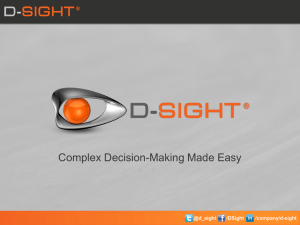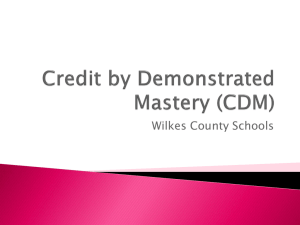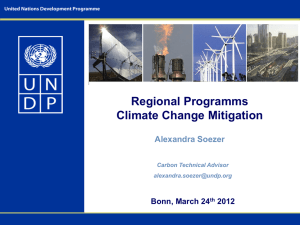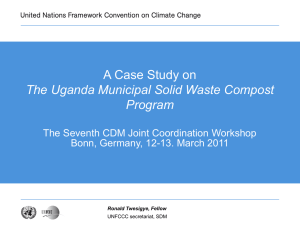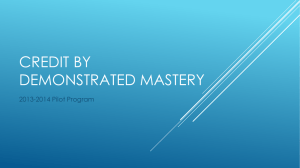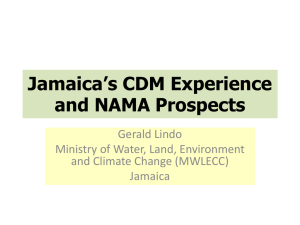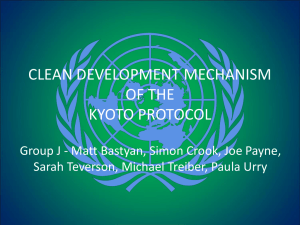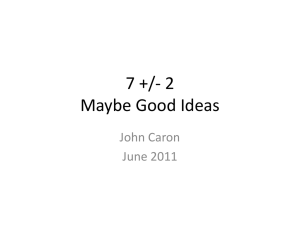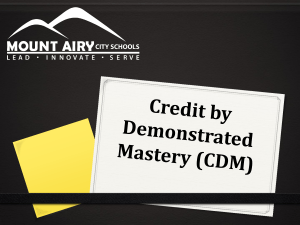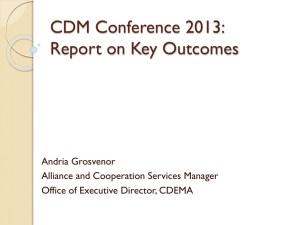D1 CDM Governace
advertisement
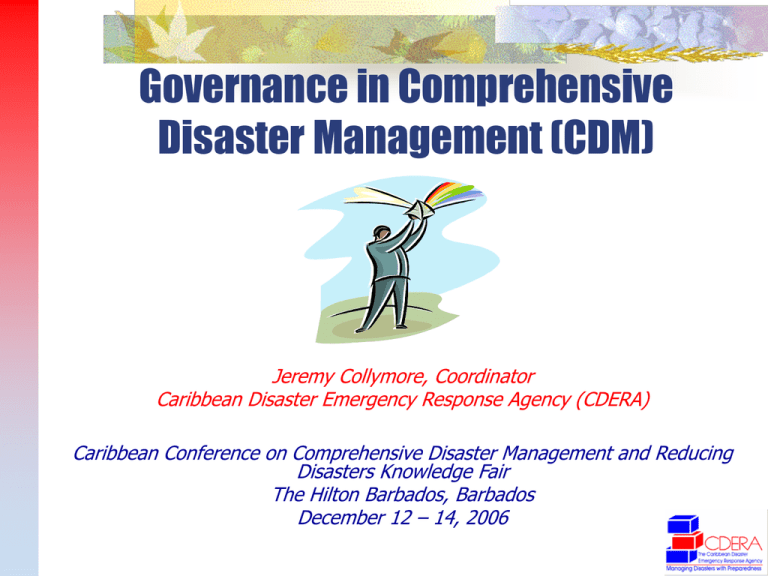
Governance in Comprehensive Disaster Management (CDM) Jeremy Collymore, Coordinator Caribbean Disaster Emergency Response Agency (CDERA) Caribbean Conference on Comprehensive Disaster Management and Reducing Disasters Knowledge Fair The Hilton Barbados, Barbados December 12 – 14, 2006 GOVERNANCE Exercise of society in managing its socio-economic political affairs Comprises the values, policies, institutions and mechanisms through which society Articulates interest Mediates differences Exercises legal rights and obligations ELEMENTS OF GOVERNANCE Economic – decision making processes that inform internal and external economic activities and relationships Political – decision making to formulate policies Administrative - system of policy implementation INTRINSIC PROCESSES Participation Consultation Shared Responsibility DESIRED OUTCOMES Equity Reduced Poverty Improved Quality of Life CDM DEFINED Comprehensive Disaster Management (CDM) involves all actions required to ensure that a country/jurisdiction has a capability to deal with all types of hazards, all phases of the Disaster Management Cycle by coordinating the wide-ranging actions and utilising all necessary resources. CDM INTER-RELATED COMPONENTS Multi-Hazard Multi-faceted Multi-Disciplinary Multi-sectoral Integrated Comprehensive Management + 6 NGO •IFRCS (Red Cross), ADRA, CARIPEDA, CCA 1 Member countries & NDO Organizations 2 Donors IDB, USAID/OFDA, CDB, World Bank European Union, CIDA, DFID/C, Japan, OAS 2 Donors UWI (Geography & Geology, Seismic, CARDIN, Disaster Management Unit, Faculty of Engineering), CIMH, IMA, ACCC/UWICED 4 Response Partners RSS, SOUTHCOM, CDRU, Rentech – Oil Spills, Airlines 3 Regional Sector Partners PAHO/WHO, FAO, CTO, CHA, ITU/CTU, CARILEC, CMO, OECS/NRMU ISSUES IN REALIZING CDM Recognising linkages between management, environment development disaster and Broadens the range of actors A revised mandate for the national and regional organisations, incorporating the CDM Policy ISSUES IN REALIZING CDM (Cont’d) Introduces new decision making approaches to Requires an inventory of mandates Clear allocation of responsibilities, possibly within a legislative framework CDM IMPLEMENTATION ESSENTIALS More effective use of all resources, including those of the private sector and other relevant organisations The identification and definition of a coordination mechanism involving all new stakeholders CRITICAL IMPLEMENTATION STEPS Consensus on a regional strategic framework informed by the collective priorised needs of stakeholders Inclusion in the Public and Private Sector Reform agenda GOVERNANCE ISSUES IN CDM: What are they? Who are the actors? What are the decision-making roles of the actors? What are the instruments used to engage discourse? How is the contribution of the stakeholders fashioned into policy and programme? What voice is given to the partners and when? CDM GOVERNANCE REQUIREMENTS How Internal Dialogue Policy and Programme Mainstreaming Performance Culture CDM Governance Requirements Results Based Management (RBM) Monitoring and Evaluation (M&E) Reporting Joint Missions Cooperative Programming Aid Flows Aligned to Agreed Priorities` CDM Governance Requirements Results Based Management Tools Monitoring and Evaluation Programme Design Proposal Writing System Wide Assessments GOVERNANCE PROCESS Consultation/Participation Document Sharing or Development Townhall Meetings (How Structured) Iterative Limited to Implementation or Design and Evaluation LEGAL/INSTITUTIONAL FRAMEWORK (A) Are the empowered adequate for managing the change? Do they represent potential impositions? How are equity issues decided? LEGAL/INSTITUTIONAL FRAMEWORK (B) Know coping capacity Utilize existing policy or support policy development Harmonise tools for assessment Embrace transparency at all points of support STRUCTURING CDM AID DELIVERY Assistance Linked to Outcomes Not time driven Making a difference rather than expending funds Know legal/institutional framework Grievance procedures mechanism Evaluation of support in anchored outcomes rather than solely outputs to SCALING ISSUES Sub-regions Regional Association of Caribbean States Pan-American Organisation of Eastern Caribbean States IACN International United Nations HUMANITARIAN GOVERNANCE Who sets response times? Why is response not linked to recovery? What is the conflict between clean-up and DANA? Is food for labour real participation? What is the institutional dislocation potential of the cluster approach? Perceptions of Donors: A Challenge Host Government organisations are too weak and personnel insufficiently trained Governments are corrupt Bureaucracy is an obstacle to free exercise of development and humanitarian assistance Donor and aid organisations do not have to be accountable to Government Key Areas of Mainstreaming Policy Strategy Spatial Planning Project Cycle Management External Relations Institutional Capacity Key Influences on Mainstreaming Staff Ownership Cross-Organisational Buy-in Workload Organisation Champion Leadership by Line-managers Integration vs. Bullying Staff Skills Development Time Governance in Comprehensive Disaster Management (CDM) Caribbean Disaster Emergency Response Agency Building #1, Manor Lodge Lodge Hill, Saint Michael, Barbados Tel No: (246) 425-0386 Email: cdera@caribsurf.com www.cdera.org
